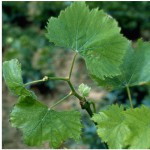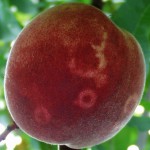Background information and relevant results
The soil-borne nepovirus Grapevine Fanleaf Virus (GFLV) causes grapevine fanleaf disease and Plum Pox Potyvirus (PPV) infects stone fruit trees causing Sharka disease. Control of viral vectors in woody plants either remains inefficient or is being restricted because of the detrimental effects of the pesticides on the environment. Given the economic importance of these viruses, several attempts were made to achieve resistance by the introduction of CP genes.
In order to produce resistant apricots, cherries, plums and grapevines not only an efficient protection, but also environmental safety aspects were considered. Concerns have been raised regarding potential ecological risks of transgenic plants. Although these concerns deserve attentive observation, only experimental data in a step-by-step approach will allow judging the value of these crops.
Since for experimental field trials in Austria data on a precise molecular characterization of the different events is a prerequisite, this was achieved by Southern blot and PCR analyses, both of T-DNA and backbone vector sequences.
Transgene instability has been repeatedly addressed as adverse long-term effect. In our studies the expression in woody plants, such as stone fruits, appears to be stable under in vitro and in vivo conditions, both in the greenhouse and over long period under screenhouse conditions.
Final judgement about the value of the transgenic lines can be obtained only by infection trials to determine, which of the lines exhibits a protected phenotype, while maintaining interesting agronomic traits.
Stage of Development
In vitro assays at the lab level, in planta assays in the greenhouse and in the screenhouse have been successfully conducted.
Reasons for delaying, diverting or stopping the research
Field experiments with virus gene expressing fruit trees and grapevines resistant against different viruses (PPV and GFLV) could not be conducted, because of the hurdles of liability, e.g. insurance requirements.
Foregone Benefits
The cultivation of genetically engineered fruit trees and grapevines with resistance to virus diseases could substantially reduce the use of insecticides in these crops, safeguarding higher quantity and quality yields, even under high pathogen pressure. This would have a direct beneficial impact on the environment, human health, production costs and profitability of these crops. Organic farmers could especially benefit from these plants, since they would ensure an acceptable and reasonable level of protection and reduce the need for synthetic pesticides.
More in general, the use of these plants will ensure the future production of fruits and grapevines in Europe, maintain the positive effect of landscape conservation and reduce the dependence on imports of these foods.
Cost of Research
The research efforts initiated in the late 1980ies were supported by the Austrian Ministries BMWF and BMLFUW, the EU and the University of Natural Resources and Applied Life Sciences (BOKU) with an amount of ~1.587.000 €.
Pictures
References
Maghuly F., Khan M.A., Borroto Fernandez E., Druart P., Bernard Watillon B., Laimer M. 2008. Stress regulated expression of the GUS-marker gene (uidA) under the control of plant calmodulin and viral 35S promoters in a model fruit tree rootstock: Prunus incisa x serrula. J. Biotechn. 135: 105-116
Prins M., Laimer M., Noris E., Schultz J., Wassenegger M., Tepfer M. 2008. Strategies for antiviral resistance in transgenic plants. Mol. Plant Pathol. 9: 73-83.
Laimer M. 2007. Transgenic grapevines. Transgenic Plant Journal 1 (1): 219-227.
Maghuly F., da Câmara Machado A., Leopold S., Khan M.A., Katinger H., Laimer M. 2007. Long-term stability of marker gene expression in Prunus subhirtella: A model fruit tree species. J. of Biotechn. 127: 310-321.
Laimer M. 2006. Virus resistance breeding in fruit trees. In: Transgenic Trees. Fladung M. and Ewald D. eds. Springer. 181-199.
Maghuly F., Leopold St., da Câmara Machado A., Borroto Fernandez E., Khan M.A., Gambino G., Gribaudo I., Schartl A., Laimer M. 2006. Molecular characterization of grapevine plants with GFLV Resistance Genes: II. Plant Cell Rep. 25: 546-553.
Laimer M., Mendonça D., Myrta A., Boscia D., Katinger H. 2005. Molecular characterization of Austrian PPV isolates. Phytopath. Polonica 36: 25 – 32.
Laimer M., Mendonça D., da Câmara Machado A., Maghuly F., Khan M., Katinger H. 2005. Resistance breeding against PPV in Austria: State of the art. Phytopath. Polonica 36: 97 – 105.
Gambino G., Gribaudo I., Leopold St., Schartl A. and Laimer M. 2005. Molecular characterization of grapevine plants with GFLV Resistance Genes: I. Plant Cell Reports 24: 655 -662.
Laimer M. 2005. The biotechnology`s contribution to meeting today`s challenges. Fifth Vienna Globalization Symposium. 13. – 14. 5. 2004. 227 – 232.
Laimer M., Mendonça D., Maghuly F., Marzban G., Leopold S., Khan M., Kirilla Z., Balla I. and Katinger H. 2005. Biotechnology of temperate fruit trees. Acta Biochim. Polon. 52 (3): 673-678.
Laimer M. 2004. The GMO Debate: The European Responses. Reports of the 4. Transatlantic Conference on American-European Universities Partnerships in Food and Agricultural Education and Research. C. Karssen (ed.) Beauvais, 2. – 3. April 2003. 80-89.
Laimer M. 2003. Characterisation of transgenic fruit trees and analyses of direct and indirect biological interactions. In: Ecological Impact of GMO Dissemination in Agro-Ecosystems. (eds. Lelley T., Balázs E. and Tepfer M.) Facultas, Vienna: 101-113.
Laimer M., Mendonça D., Arthofer W., Hanzer V., Myrta A., Boscia D. 2003. Occurrence of different plum pox virus strains in several stone fruit species in Austria. Opt. Médit. Sér. B 45: 79-83.
Laimer M. 2003. The development of transformation of temperate woody fruit crops. In: Laimer M. and Rücker W. 2003. Plant Tissue Culture: 100 years since Gottlieb Haberlandt. Springer Verlag, Wien: 217-242.
Minafra A., Goelles R., da Câmara Machado A., Saldarelli P., Buzkan N., Savino V., Martelli G.P., Katinger H., Laimer da Câmara Machado M. 1998. Expression of the coat protein gene of grapevine virus A and B in Nicotiana, and evaluation of the resistance conferred to transgenic plants. J. of Plant Pathol. 80:197-202.
Gölles R., da Câmara Machado A., Tsolova V., Bouquet A., Moser R., Katinger H., Laimer da Câmara Machado M. 1997. Transformation of somatic embryos of Vitis sp. with different constructs containing nucleotide sequences from nepovirus coat protein genes. Acta Hort. 447: 265-272.
da Câmara Machado A., Puschmann M., Pühringer H., Kremen R., Katinger H., Laimer da Câmara Machado M. 1995. Somatic embryogenesis of Prunus subhirtella autumno-rosa and regeneration of transgenic plants after Agrobacterium-mediated transformation. Plant Cell Rep. 14: 335-340.
Laimer da Câmara Machado M., da Câmara Machado A., Hanzer V., Weiß H., Regner F., Steinkellner H., Mattanovich D., Plail R., Knapp E., Kalthoff B., Katinger H. 1992. Regnereration of transgenic plants of Prunus armeniaca containing the coat protein gene of Plum Pox Virus. Plant Cell Rep. 11: 25-29
Principal Investigator
Margit Laimer, Pflanzenbiotechnologie Gruppe, IAM, Department Biotechnologie, Universität für Bodenkultur (BOKU), Muthgasse 18, A-1190 Vienna, Austria
Contact Information
m.laimer@iam.boku.ac.at
Additional references
http://www.biotec.boku.ac.at/pbu.html
http://www.boku.ac.at/sicherheitsforschung/open-e.htm



